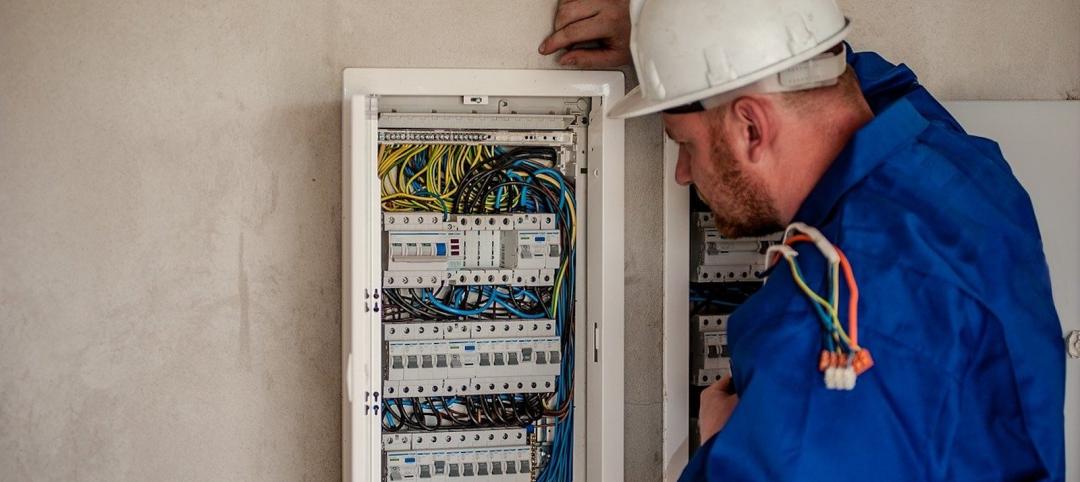Global design firm HOK has released research providing lab owners and developers guidance for reducing operational and embodied carbon to meet net zero goals.
HOK’s initial analysis indicates that it is possible to build and operate labs in accordance with the sustainable design goals of the RIBA and AIA 2030 challenges, according to the report’s executive summary. “The approaches studied in this analysis can significantly reduce the whole-life carbon (operational carbon + embodied carbon × building lifespan) of a lab building,” the document says.
Modelling revealed little difference between vertical and linear lab building forms in achieving net zero. But linear labs’ expansive roofs provide an advantage by allowing for more solar panel arrays.
The analysis examined new lab buildings, but the most sustainable option is to reuse and adapt existing buildings, HOK says. Lab buildings are significantly more energy intensive to operate than commercial office buildings and their embodied carbon also is much higher than typical commercial space. Labs demand far greater ventilation than most building types and are home to highly energy-intensive equipment that is often in operation 24 hours a day. Labs also require robust structural systems to limit building vibration and support heavy building loads.
HOK’s analysis looked at numerous strategies to reduce carbon footprint in lab structures. The report provides technical details on these approaches.
Related Stories
Legislation | Mar 28, 2022
LEED Platinum office tower faces millions in fines due to New York’s Local Law 97
One Bryant Park, also known as the Bank of America Tower, in Manhattan faces an estimated $2.4 million in annual fines when New York City’s York’s Local Law 97 goes into effect.
Codes and Standards | Mar 24, 2022
New York senate moves to speed up fossil fuel ban in new buildings
Lawmakers in the New York State Senate are backing a proposal to ban fossil fuels in new building construction three years sooner than a plan proposed by Gov. Kathy Hochul.
Codes and Standards | Mar 23, 2022
High office vacancies have cities rethinking downtown zoning
As record-high office vacancies persist in U.S. urban areas, cities are rethinking zoning policy.
Codes and Standards | Mar 22, 2022
Dept. of Energy awards $32 million for next-generation building retrofits
The U.S. Dept. of Energy has awarded a total of $32 million for more than 30 next-generation building retrofit projects that will dramatically improve affordable housing technologies, according to a DOE news release.
Legislation | Mar 18, 2022
New framework to help site community solar projects released
The Solar Energy Industries Association (SEIA) released a new report to aid policymakers in siting community solar projects.
Codes and Standards | Mar 17, 2022
Dept. of Energy seeks input on building-integrated photovoltaic systems
The U.S. Department of Energy (DOE) Solar Energy Technologies Office (SETO) and Building Technologies Office (BTO) recently issued a request for information to gather input on technical and commercial challenges and opportunities for building-integrated photovoltaic (BIPV) systems.
Legislation | Mar 16, 2022
Weak federal commercial real estate rules will hamper seizing Russian assets
Lax disclosure regulations that have made the U.S. a global hot spot for money laundering via real estate holdings will make it difficult for officials to seize properties from Russian oligarchs.
Codes and Standards | Mar 15, 2022
First company awarded Fitwel Certification in Senior Housing for Occupant Health & Wellness
The Springs at Greer Gardens in Eugene, Ore., is the first property to earn a Fitwel global health certification under the newly created senior housing scorecard.
Codes and Standards | Mar 7, 2022
Late payments in the construction industry rose in 2021
Last year was a tough one for contractors when it comes to getting paid on time.
Codes and Standards | Mar 7, 2022
Massachusetts proposed energy code changes don’t ban gas
Proposed changes to the Massachusetts energy code would provide incentives for builders to fully electrify buildings, but not impose a ban on natural gas hookups.

















